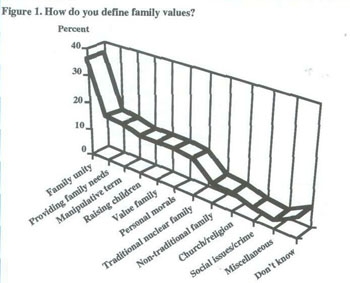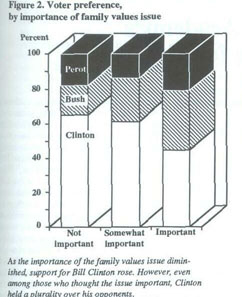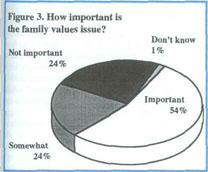|
The Pulse

|
Why family values didn't sell
By DESERRIE RUPTASH,
KRISTAL BRAZAITIS and
RICHARD SCHULDT
|
Republicans hoped to sell "family
values" as a 1992 campaign
theme that would resonate with
voters, but voters weren't buying. The
Republican family values strategy lost
big. A September survey of the Illinois
public demonstrates that voters defined
family values in much broader terms
than Republican strategists who sought
to capitalize on the issue, and that Democrats probably gained more as a result
of the GOP strategy.
The telephone poll by the Survey Research Office at Sangamon State University yields insights into why the family
values issue never took hold with the
electorate and suggests possibilities concerning how this issue could be used to
woo voters in the future. The survey was
conducted in September with 642 Illinois
residents (522 of whom were likely voters) and has a margin of error of 5 percent.

|
One problem for campaign strategists
who hoped Murphy Brown's out-of-wedlock baby would be a productive
campaign issue was that the public has no
single definition of family values, and the
Republican notion — the 1950s image of
dad as breadwinner, mom as homemaker
— hit home with just a small fraction of
the Illinois public (see figure 1).
When asked, "What does 'family
values' mean to you?," the most frequent
answer, given by a third of those polled,
was that of family unity, togetherness
and interpersonal relations (closeness,
giving, caring, trust and communication).
Every demographic and political group
offered this response most frequently.
Concerns that focused on providing for
the family's needs comprised the second
most frequent definition, with respondents mentioning the importance of having a job, an adequate income, a decent
standard of living and needs relating to
shelter, education, health and child care.
More people thought family values
was a vague term used in a manipulative
fashion and a private, not a political
issue, than defined it as meaning the
traditional nuclear family.
|
The importance of the issue to voters
is related to September presidential vote
intention. While Clinton was leading in
every "importance" group (see figure 2),
his lead over Bush was under 10 percentage points among those who saw the
issue as important, nearly 30 points
among those who saw the issue as somewhat important, and over 40 points
among those who saw the issue as not
important.
What, then, of the impact on the 1992
election? From the perspective of the
Bush campaign, the best that can be said
for its family values strategy is that the
issue acted to keep Republicans in the
fold, primarily by reinforcing a choice
which was already made and, secondarily, by giving Republicans a reason to
stay. At the same time, there were few
converts to Bush from Democrats and
independents because of this issue.
From the perspective of the Clinton
campaign, the Republican emphasis on
this issue certainly did not hurt; in fact, it
no doubt helped. First, the narrow definition of family values offered by the most
vocal segment of the Republican party
coincided with a personal definition salient to only about one-tenth of the pub-
30/April 1993/Illinois Issues


|
lic, while one in six resented the use of
this issue as manipulative. A plurality of
respondents saw no difference between
the parties on the issue and, of those who
did, somewhat more chose the Democratic than the Republican party as closer
to their own view of family values. More
importantly, the Republican emphasis on
the issue was simply irrelevant to most of
the public in 1992. Its emphasis only
contributed to the perception that the
incumbent administration "just didn't get
it." When voters were asked why they
supported their presidential choice, only
2 percent spontaneously mentioned the
family values issue.
Indeed, evidence is
abundant that most
voters were focused
on the performance
of the economy and
on the need for a
change.
What about the
future of family
values as an issue?
Certainly, over one-half of the public
says the issue is important (see figure
3), and this does not
differ by party. Yet,
there is an increasing diversity of
family structure in
the United States.
Attempts to define
family values in
terms of the family
structure common
in the 1950s will
coincide with the
family structure and
the views of only a minority of the public.
If the issue is to be used effectively in
the political realm, the definition needs
to be construed broadly in terms of
family structure and related to specific
policies which resonate with the public's
own ideas of family values. This focus
would lessen the feeling that family
values is being used in a manipulative
fashion.
The issue needs to be defined in terms
of specific programs which address the
family-related concerns of the public:
programs that would facilitate family
unity and relationships in such areas as
shelter, income, health care and
education. These were the most
common themes people talked
about when asked about family
values, themes that deal with the
realities that families face, not
just a vague ideal of the nuclear
family. *
|
Deserrie Ruptash is a contractual
research associate for the Survey Research Office in the Institute for Public
Affairs at Sangamon State University,
Springfield, Kristal Brazaitis is a graduate assistant in the institute, and Richard Schuldt is director of the Survey
Research Office.
April 1993/Illinois Issues/31
|

